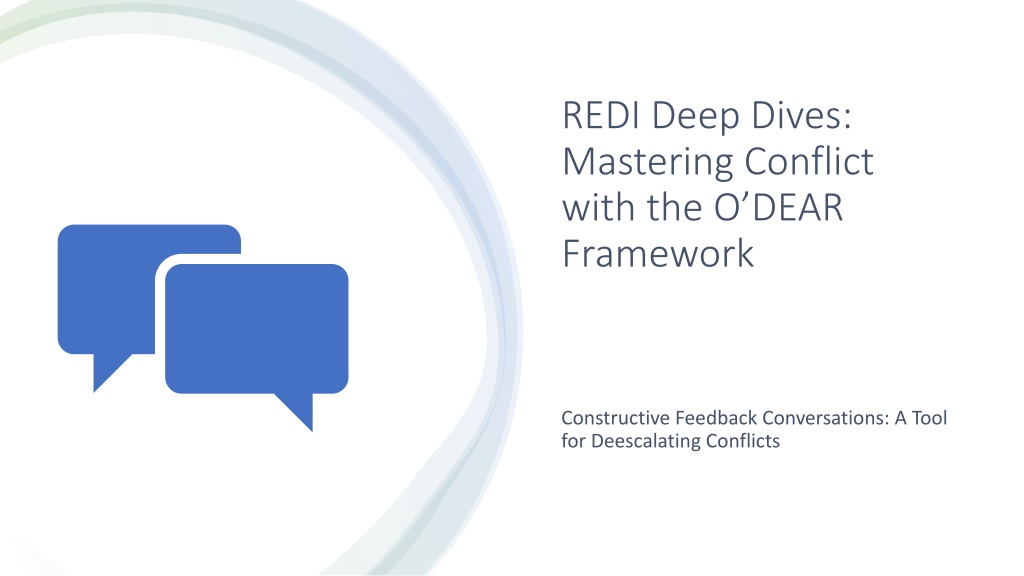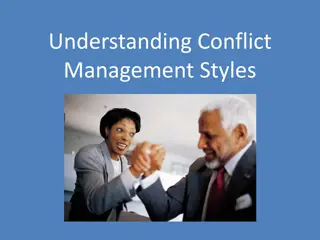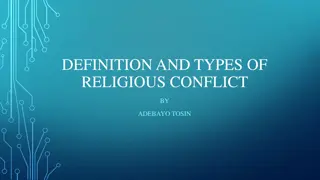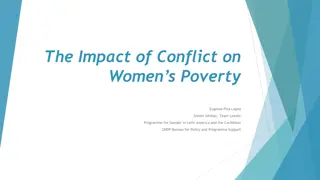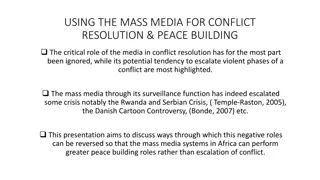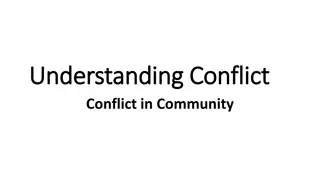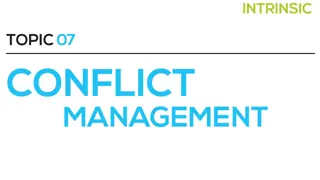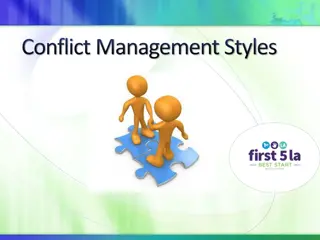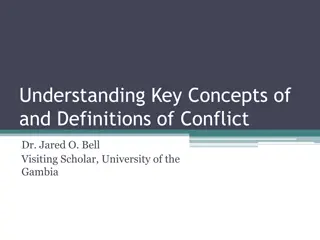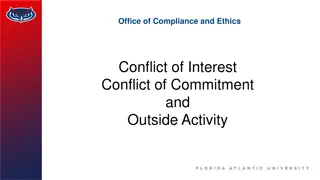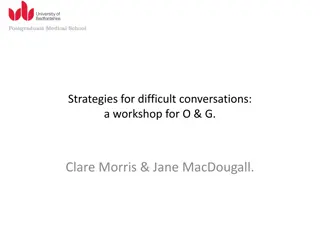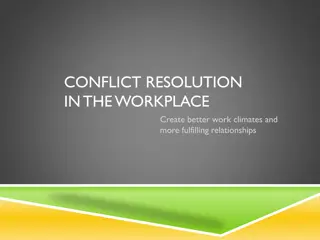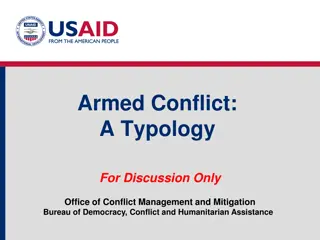Mastering Conflict with the O'DEAR Framework
Learn how to effectively handle conflicts using the O'DEAR framework, a model designed to facilitate constructive feedback conversations and deescalate conflicts. The O'DEAR model, which stands for Open, Describe, Explain, Ask, Request, provides a structured approach for addressing low to moderate interpersonal concerns, fostering understanding, and building better relationships. Evaluate the suitability of the O'DEAR model for different conflict situations and understand its importance in promoting Respectful Environments, Equity, Diversity, and Inclusion (REDI).
Download Presentation

Please find below an Image/Link to download the presentation.
The content on the website is provided AS IS for your information and personal use only. It may not be sold, licensed, or shared on other websites without obtaining consent from the author.If you encounter any issues during the download, it is possible that the publisher has removed the file from their server.
You are allowed to download the files provided on this website for personal or commercial use, subject to the condition that they are used lawfully. All files are the property of their respective owners.
The content on the website is provided AS IS for your information and personal use only. It may not be sold, licensed, or shared on other websites without obtaining consent from the author.
E N D
Presentation Transcript
REDI Deep Dives: Mastering Conflict with the O DEAR Framework Constructive Feedback Conversations: A Tool for Deescalating Conflicts
Thank you for your interest in engaging with this REDI resource. If you decide to use this resource, could you please fill out this form? (https://redi.med.ubc.ca/resourcefeedback) Let us know what unit at UBC you are from and any feedback you may have. This will help us understand how our resources are being used and ensure that we are meeting the needs of the community. Welcome If there are other similar types resources you would like to see, please let us know in the form, too. Thanks, REDI Team
The O'DEAR Model The O'DEAR Model is an easy-to-use outline to help script a conversation in which you approach a colleague to discuss low to moderate-level interpersonal concerns. The O'DEAR model allows the speaker to assert themselves, express their concerns, seek understanding, and gain buy-in that will contribute to a better future. This model is particularly useful for "smallish" conflicts or differences and helps to de- escalate and build understanding. This may not be appropriate for major conflicts such as sexual misconduct or egregious racial microaggressions especially when there are power dynamics at play (eg. Student supervisor). O'DEAR stands for Open, Describe, Explain, Ask, Request
Evaluate the situation using these questions to determine if O'DEAR is an appropriate approach for this issue. Will I be safe having this conversation? Will I be able to keep my emotions under control? Is the issue or disagreement "small" enough to be addressed effectively by an O'DEAR conversation? Before you act, consider the context Am I the right person to be having this conversation with the other person? Am I in an appropriate position of power relative to the other person? Is there a potential for retaliation against me because of this conversation? If you are unsure, you may want to try a different approach or enlist the help of someone who can intervene appropriately in the situation.
Why is O'DEAR important to Respectful Environments, Equity, Diversity, and Inclusion (REDI)? As we work towards a more diverse and intercultural work environment, there may be more opportunities to mis-read another person's behaviour or make assumptions about intent based on your own worldviews and lived experiences. The O'DEAR model helps us respond to conflict with curiosity, inquire about behaviour, leads to greater understanding, and reduces barriers. O'DEAR provides a tool to stay in relationship with each other, build our intercultural competencies and ensure that we are able to work effectively together in diverse groups.
Examples where an O'DEAR approach might be important A new resident makes a minor mistake in a medical operation and was yawning as she spoke to a patient. Instead of openly critiquing the resident, "What are you doing, you shouldn't be making mistakes like that!", you have an O'DEAR conversation and learn that her 10 year old son has been going through chemotherapy and has been keeping her up at night. You are the EDI lead in your department, you are waiting for another colleague to give you feedback on a change in practice. The colleague is new to the unit and has not responded to your repeated emails. Instead of reporting to the department head about this colleague, you have an O'DEAR conversation instead and learn that your colleague is teaching 2 new classes at this moment and that the document you had sent them was not in an accessible format for her. You learn that she has very low vision and had been worried about disclosing this to you.
Ask or state your desire to speak with the person and provide a general idea of the topic Do say: Hey, do have a few minutes to talk with me about something email communication? ; I d like to speak with you about your course assessment? When is a good time? Don t say something too vague that the person will spend time worrying about what it is about. For example, don t say Can we meet tomorrow to talk about something you did that upset me . Open
Describe the persons behaviour (what they said or did) specifically, neutrally, and objectively. Do say: When I started speaking, you turned away and said oh, that doesn t matter ; I have not received the draft document I was expecting from you by Tuesday Describe Don t use excusatory language or make assumptions about other people s intent You don t care about me or the work that I do." Don tuse YOU language, just use I language.
Explain the impact this had on you or your work. Do say: Ifelt shut down and disrespected ; I m frustrated because I m going to have to work over the weekend to meet Monday s deadline Don tuse YOU language, just use I language. Avoid explaining the impact by turning it into an accusation or by editorializing: "I felt like you don't respect me" or "I felt like you were really rude." Explain
Ask the other person to clarify their perspective on the situation or incident. Do say: What was your perspective? ; Can you tell me a little bit about what was going on for you? Do: Ask, genuinely, for their side of the story. Your goal is to get information and gain understanding. Don't ask a rhetorical question or a question that contains a veiled criticism. "Did you not think that was rude of you?" "What the heck were you thinking?" "Did you consider my needs at all when you acted that way?" "What did you think that was going to accomplish?" "Why were you so mean?" Ask
Request that an alternative behaviour or approach be taken in the future. This provides a starting point for problem- solving together. Do say: I d appreciate it if you spoke to me directly about your frustrations so we could work through it together ; Next time, can you please just let me know earlier so I can plan accordingly Do focus on providing an observable action/behavior that the other person can do in the future. Don't make the request about the person. "Could you not be such a jerk next time?" Request
Find a partner among your colleagues (consider using breakout rooms if meeting via videoconference) Take turns practicing the use of the ODEAR model with each other. Below are some hypothetical conflicts that you can use (feel free to make up your own): Person A did not return an item they borrowed from Person B. Person A arrived very late for a meeting with Person B, and there was no communication. Person A did Person B a big favour but Person B was unwilling to reciprocate when Person A needed a favour. Person A sent an email asking for information, but did not receive a reply from Person B. Person A was running a meeting and did not acknowledge Person B's attempts to contribute. Person A has tried several times to meet with Person B, but Person B has repeatedly avoided setting aside time to meet. Practice activity
